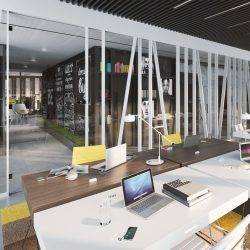November 15, 2017
The contribution of personality to the performance of agile workers
 The introduction of agile working into organisations has typically focussed on the workstyles of different job roles, but has tended to treat the jobholders within these groups in the same way. The successful introduction of new ways of working clearly relies on the willingness of the people occupying the job roles to embrace new ways of working; yet there has been little investigation of the needs of agile workers with different personality types beyond looking at the needs of extroverts and introverts. These studies have tended to focus on the workplace; for example, the Cushman Wakefield Workplace Programme briefing paper examines how organisations can accommodate the needs of extroverts and introverts working together in the workplace. However, using OCEAN personality profiles, Nigel Oseland found that different personality types have different preferences, which in turn are likely to affect their performance at work.
The introduction of agile working into organisations has typically focussed on the workstyles of different job roles, but has tended to treat the jobholders within these groups in the same way. The successful introduction of new ways of working clearly relies on the willingness of the people occupying the job roles to embrace new ways of working; yet there has been little investigation of the needs of agile workers with different personality types beyond looking at the needs of extroverts and introverts. These studies have tended to focus on the workplace; for example, the Cushman Wakefield Workplace Programme briefing paper examines how organisations can accommodate the needs of extroverts and introverts working together in the workplace. However, using OCEAN personality profiles, Nigel Oseland found that different personality types have different preferences, which in turn are likely to affect their performance at work.














 Most private sector workers are still not pushing for pay rises, despite falling real wages and low unemployment, according to the latest quarterly CIPD/The Adecco Group Labour Market Outlook survey. Only a quarter (24 percent) of employers in the private sector say they are under some or significant pressure to raise wages from the majority of their workforce, while almost four in ten private sector firms (38 percent) say they face no pressure at all to raise wages. The most common reason given by private sector employers (23 percent) for the lack of pressure to raise wages is a recognition among workers that the business cannot afford more generous pay increases, underlining the productivity challenge many firms face. The survey of more than 2,000 UK employers shows a slightly higher proportion of private sector employers (36 percent) cite either some or significant pay pressure to raise wages for certain roles, particularly among high and middle-skilled jobs.
Most private sector workers are still not pushing for pay rises, despite falling real wages and low unemployment, according to the latest quarterly CIPD/The Adecco Group Labour Market Outlook survey. Only a quarter (24 percent) of employers in the private sector say they are under some or significant pressure to raise wages from the majority of their workforce, while almost four in ten private sector firms (38 percent) say they face no pressure at all to raise wages. The most common reason given by private sector employers (23 percent) for the lack of pressure to raise wages is a recognition among workers that the business cannot afford more generous pay increases, underlining the productivity challenge many firms face. The survey of more than 2,000 UK employers shows a slightly higher proportion of private sector employers (36 percent) cite either some or significant pay pressure to raise wages for certain roles, particularly among high and middle-skilled jobs.




 Those working within the built environment are already in the change business, was the view of Neil Usher of
Those working within the built environment are already in the change business, was the view of Neil Usher of 













November 16, 2017
Astonishing Uber employment case could lead to fresh battles over gig economy
by Philip Richardson • Comment, Flexible working, Legal news, Technology
More →